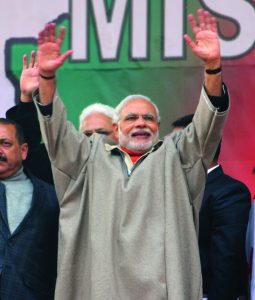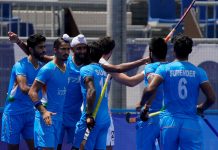 In an interview to a television channel as part of his ongoing election campaign Prime Minister Narendra Modi had once again said that only the former Prime Minister Atal Bihari Vajpayee’s formula of “<Insaniyat, Kashmiriyat and Jamhooriyat>” would work in Jammu and Kashmir. But at the same time, the PM made a case for the removal of the Article 370 and 35A which give special Constitutional status to Kashmir. According to him, the articles have done “maximum damage” to Kashmir as no investors wanted to go to the state as they couldn’t buy land.
In an interview to a television channel as part of his ongoing election campaign Prime Minister Narendra Modi had once again said that only the former Prime Minister Atal Bihari Vajpayee’s formula of “<Insaniyat, Kashmiriyat and Jamhooriyat>” would work in Jammu and Kashmir. But at the same time, the PM made a case for the removal of the Article 370 and 35A which give special Constitutional status to Kashmir. According to him, the articles have done “maximum damage” to Kashmir as no investors wanted to go to the state as they couldn’t buy land.
Both these approaches are inherently contradictory in nature. Vajpayee’s call for resolution of Kashmir “within the ambit of Insaniyat” was about working for a consensus-based resolution of Kashmir with Pakistan on board. It was also about willingness to talk to separatists in Kashmir outside the framework of the Constitution. But whenever Modi has spoken about Insaniyat, it hasn’t meant much beyond iteration of a slogan. In its five years in power, the BJP-led government at the centre has desisted from engaging with Kashmiri separatists or Pakistan except on its terms.
Similarly, when the PM speaks of Jamhooriyat, it is generally about a large turnout in the Assembly polls in J&K. Overall, the PM’s repeated use of Vajpayee statement has divested the terms of ‘Insaniyat, Kashmiriyat and Jamhooriyat’ of their profound political import when understood in the light of Kashmir.
At the same time juxtaposing Vajpayee’s statement with the supposed need to do away with the Article 370 and 35A kills the otherwise goodwill and consideration inherent in the former. In Kashmir, the attack on the articles in the name of development is seen as a disguised attempt to change the demography of the state. In fact, the BJP’s accent is now more on removal of the Article 35A than Article 370. For the party, it is the Article 35A and not Article 370 which comes in the way of settling citizens from other parts of the country in J&K. They believe that the only way to resolve Kashmir issue is through a sweeping demographic change in the state.
Article 35A defines permanent residents of the state, restricts employment to permanent residents and grants state legislature power with regards to settlements in the state. Now if the Article goes, it means the protection available to permanent residents will go and this protection will also go in case of employment and acquisition of property and scholarships.
This has only deepened the anxiety in Kashmir about the BJP’s policy on the state should it return to power at the centre. The BJP president Amit Shah has only further added to these fears by making it clear that Article 370 will be withdrawn from Jammu and Kashmir, if the saffron party is voted back to power again.
“We will remove Article 370 if you make Narendra Modi the prime minister again,” Shah said at a public rally in Palamau district in Jharkhand. “We cannot compromise with the security of the nation. Pakistan wants to separate Kashmir from India. We will not allow it”.
If anything, the BJP’s Kashmir policy is thus destined to add to the deep sense of grievance and alienation that fuels the militancy in the state. In recent years Kashmir has already witnessed much turmoil over the attempts to withdraw the state’s special position under Indian Constitution.
But as Pakistan Prime Minister Imran Khan too mentioned in a recent interview, it is the PM Modi too who is seen as the best hope for a Kashmir resolution. And Khan is not alone in this opinion, a significant section of public opinion in Kashmir also shares it. And there is a reason for it. The previous BJP government under Vajpayee is credited with initiating one of the most promising dialogue processes with Pakistan. And such talks happened despite Kargil war and nuclear explosions by the two countries. But would Modi adopt Vajpayee’s Kashmir mantra both in letter and spirit once he returns to power? There’s no telling this would happen. But if it does, it would certainly make a redeeming difference to the situation in the troubled state.
letters@tehelka.com












